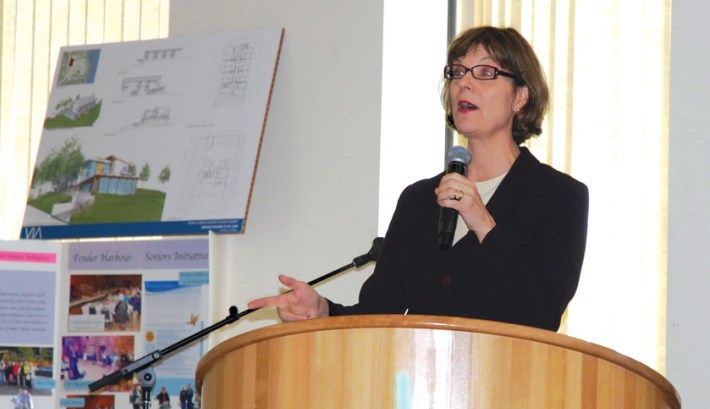Seniors who live in private and non-profit care facilities versus public ones are 54 per cent more likely to die in hospital, according to a report by BC Seniors Advocate Isobel Mackenzie.
The report, released Aug. 1, compares hospitalization rates for residents among contracted long-term care facilities, both private and non-profit, and public facilities. “After careful review of multi-year data, a consistent pattern emerges that shows a demonstrably greater use of the emergency department and hospital beds by residents from contracted long term care facilities,” said Mackenzie in a release.
Long-term care has been a divisive issue on the Sunshine Coast since the decision to close Shorncliffe and Totem Lodge, which are both public facilities. A new long-term care facility to be operated by private provider Trellis Seniors Services is expected to be constructed on shíshálh Nation band lands.
Ian McClatchie of Protect Public Health Care (PPHC), a group that has been lobbying against the Trellis deal, praised the report. “It’s simply confirmation of what we’ve been saying for two years now, that in general, private long-term care facilities, both profit and not-profit, deliver a poorer quality of care than publicly owned and operated ones,” he told Coast Reporter. He said to the extent they can, the group will be using the report to push Health Minister Adrian Dix to reconsider the deal. “There could have been an alternative facility, a publicly owned and operated facility constructed by now,” McClatchie said.
Powell River-Sunshine Coast MLA Nicholas Simons called the report “concerning,” and said that he still believes “public is better.” In terms of whether the report will have an impact on the Trellis deal, he said the health minister is aware of the report. “I think the situation our minister was put in was a difficult one, but I can’t speak for him as to whether this will have any impact on the decision.”
PPHC, which formed following the announcement that Shorncliffe and Totem would be closed, has acquired 10,000 signatures in support of their request that a replacement facility be publicly funded and operated. The group recently wrote a letter to shíshálh Nation asking that it advocate on behalf of a publicly built and operated facility. Simons said he has spoken with Chief Warren Paull about the deal. “We’re all wondering, I think the whole community is wondering, why it’s taken this long, but my hope is it won’t be the end of the story either.”
According to the report, the health care system could save $16 million if the performance of contracted facilities could match that of public ones. Mackenzie also found that matched performance could save more than 15,000 bed days and “would reduce the risk of hospital acquired infections or delirium.”
Mackenzie began her investigation after receiving findings based on working shifts in six hospitals in B.C. “With a rate more than double the public facilities, we really need to ask why contracted care facilities are seeing their residents die in the hospital,” she said.
Mackenzie also says in the report that “contracted facilities have more substantiated complaints and reportable incidents than public facilities,” but that a recent provincewide satisfaction survey found “there was no overall difference in the level of satisfaction and quality of life indicators” between public and contracted facilities.
The same day the report was released, the BC Care Providers Association (BCCPA) released a statement criticizing Mackenzie’s findings, arguing that the report only focuses on two per cent of the overall visits by seniors to emergency departments. “This flawed report appears to have been produced at the last minute and is filled with questionable suppositions and political buzzwords, rather than independent research,” said Daniel Fontaine, CEO of BCCPA. The organization also said it could not verify whether the report was peer-reviewed.
In a statement, the BC Liberal seniors critic, MLA Joan Isaacs, said it “adds needless concern for families” since the report states that there is no statistically significant difference between public and contracted facilities. “The report suggests further studies are warranted and we agree that we need to dig much deeper before drawing conclusions,” said Isaacs.
A Trellis representative declined to speak with Coast Reporter about the report.



